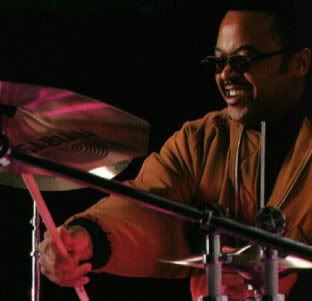 by Pico
by Pico
Jeff ‘Tain’ Watts doesn’t hail from New Orleans (he’s a native of Pittsburgh), but it seems he enjoys hanging out with guys from there. The Marsalis family—Wynton, Branford and Ellis—have enlisted his services, as well other Big Easy luminaries as Terence Blanchard and Harry Connick, Jr. Watts first made his name as a member of Wynton’s first band after Wynton left Art Blakey’s Jazz Messengers and later played alongside Branford in Sting’s touring band before joining Branford’s Tonight Show ensemble. Watts has also been in demand by the likes of George Benson, Kenny Garrett, Geri Allen and McCoy Tyner. Tain is the rare type of drummer who excels at effectively applying both power and subtlety.
Last week Watts introduced his fifth album—the second one under his own Dark Key Music imprint—titled simply Watts. That title is meant to have multiple implications; not just the leader’s last name, but also the Los Angeles Watts riots of the sixties. Like the Watts District’s famous son Charles Mingus, Tain sought to make a socially conscious jazz record, which few outside of Mingus have ever successfully attempted with instrumental jazz.
As Mingus did with Charles Mingus Presents Charles Mingus, Watts employed a piano-less foursome, with him on drums, Branford on tenor, Blanchard on trumpet, and the ever-reliable Christian McBride on acoustic bass.
Instead of this being an angry record, it’s actually very loose and wide open. Twenty years earlier, Marsalis, along with Watts and the late Milt Hinton, made such a record with Trio Jeepy, which free-wheeling spirit made this my favorite Branford record. Watts is enjoyable for essentially the same reason.
Every one of the ten selections, all written by Watts, vary in tempo while sounding focused, cohesive and full of attitude. Did I earlier say that this was not an angry record? Actually, the wrath of Tain does come out a lot in his drumming.
“Return Of The Jitney Man” is the right way to start such a record. Tain is a one-man wrecking crew on his kit, propelling acrobatic solos by both Marsalis and Blanchard. Watts himself doesn’t take a solo because he all but doing so behind the horns throughout the entire song.
“Brekky With Drecky,” a eulogy to the late Michael Brecker based on Ornette Coleman’s “Turnaround,” pares down the quartet to a trio with Branford supplying the only horn in this raucous blues that Watts peppers with explosive fills. “Katrina James” is a funky James Brown tribute that has Marsalis and Blanchard pushing each other to greater heights. On this track, Watts alternates seamlessly between two beats. “Owed…” is the oddball track as it’s the only true ballad, and also that it includes a keyboard in the form of up-and-comer Lawrence Fields’ piano.
“Dancin’ 4 Chicken,” which is derived from Watts’ contempt for modern-day Uncle Toms, begins with a false ending before the real song begins. McBride takes out a bow and leads the band into a concoction of jazz combined with the Cotton-eyed Joe before ratcheting up the intensity a couple of notches. Marsalis’ searing solo with Watts is a showstopper, and Blanchard’s following one ain’t so bad, either. When Watts has his turn, you’d swear he had an extra arm and leg.
“Wry Köln” provides no respite from that workout, as Watts begins the tune with a solo and he hardly lets up when Marsalis and Blanchard enter to play the harmolodic melody in this second song derived from Coleman. “Dingle-Dangle,” a Blanchard showcase with Marsalis sitting out, is in itself based on Mingus’ “Trinkle Tinkle.” But the spirit of Charles Mingus is nowhere more in evidence than the track that comes after this one.
“Devil’s Ring Tone – The Movie” is a contemporary take on Mingus’ “Fables Of Faubus,” which was a sharp attack on Arkansas’ infamous segregationist governor. For “Ring Tone,” Watts’ barely-disguised object of scorn is the just-departed president George W. Bush, but Tain gets his jabs in with his keen sense of humor as much as he does launching missiles with his drumsticks. The music provides the backdrop for a skit that involves some negotiation between the Devil and an agent representing “Mr. W.” For those who wants to get a better listen to the fantastic music churning underneath, there’s also a version of the song presented on the CD without the skit.
Jeff ‘Tain’ Watts might be the first great jazz drummer since Max Roach to put out a record with a social purpose, but with his virtuosic ability, challenging but tuneful compositions and an elite supporting cast, there’s more than enough to enjoy about this record if all he wanted to do was just make good jazz. Tain didn’t forget that even successful thematic records need to start with successful music.
- Christian Marien Quartett – ‘How Long Is Now’ (2024) - April 18, 2024
- Dave Douglas, feat. James Brandon Lewis – ‘Gifts’ (2024) - April 11, 2024
- Thollem – ‘Worlds In A Life, Two’ (2024) - April 8, 2024




